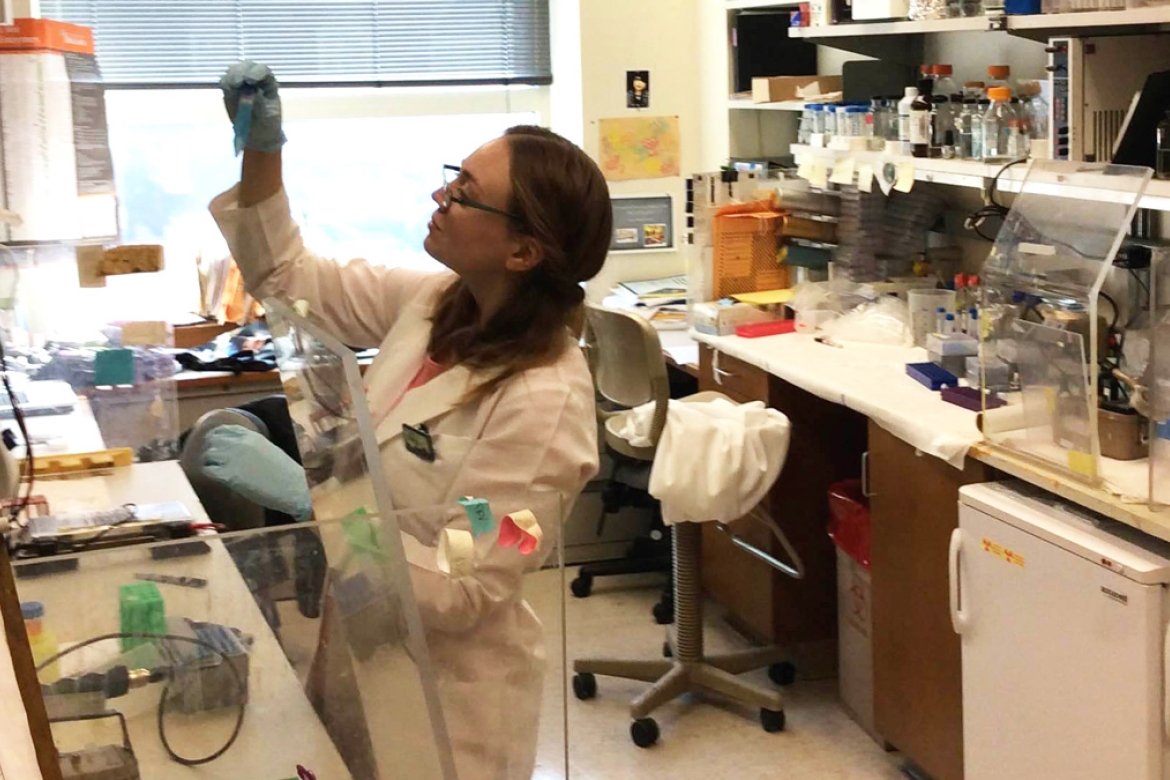Take advantage of opportunities while you are at Mount Holyoke.

Mount Holyoke and the Biochemistry Department gave me the opportunities for me to grow and become the scientist I am today.
Major: Biochemistry
Advanced Degrees: M. Phil
Graduate Program: Molecular Biophysics and Biochemistry Department, Yale University
I truly believe that. To explain why I believe that, I will discuss my transformation from a first-year at Mount Holyoke to a graduate student at Yale preparing for a scientific career. I hope at the end of this that you walk away with one message: take advantage of opportunities while you are at Mount Holyoke.
Opportunities for Research Experience (Hard Skills)
My first internship – the seed of my research experience – was at Mount Holyoke College. In the summer after my first year, I participated in the HHMI Cascade Mentoring Program at Mount Holyoke, which paired first years with upper-classmen in research labs on campus for the summer. The program provided first years, who did not have the knowledge to embark on their own research projects, the chance to develop their scientific skills and gain insight into whether a career in science would be a good fit for them in a supportive environment. It was a great experience.
After that, I worked in the same lab during the school year and then went on to an internship at University of Maryland, Baltimore County. Returning to Mount Holyoke in my junior year, I began working toward my senior thesis project with Professor Lilian Hsu of the Biochemistry Department. Not only was my first internship at Mount Holyoke, but my first long-term project was also at Mount Holyoke. Later when I applied to graduate schools, these research experiences were pivotal for my acceptance, not just in terms of the hard skills (e.g. PCR) but also in terms of softer skills (e.g. science communications).
Opportunities to Develop My Softer Skills
Every report that I wrote at Mount Holyoke laid a foundation for my ability to communicate science. When I was younger, I often overlooked or took for granted this part of my training at Mount Holyoke. Those pesky organic chemistry lab reports – a way to learn to keep your lab notebook tidy and detailed. Those 50-page biochemistry lab reports – a way to apply my classroom knowledge to the laboratory setting. In Immunology taught by Professor Sharon Stranford, pairs of students designed their own immunological study, making a budget, writing a proposal, and then finally joining the discourse, by applying our conclusions to discussion in the literature. I do this every day now! The research proposal in Biochem 314 – a way to practice grant writing.
These assignments may seem tedious, but they have real world applications. They are practice for engaging readers or an audience with your science – from presentations to grant applications to publications. Communicating science is critical for any scientist in any institution or discipline. My only regret was not taking these assignments more seriously, to practice making the writing more interesting, more concise, or more efficient. Professors and TAs take the time to offer constructive criticism and want you to develop these skills. Take advantage of this supportive learning environment. Then use your knowledge to apply for the Goldwater or the NSF GRPF.
Mentorship and the Supportive Environment at Mount Holyoke
Hopefully by now, you realize how important the Biochemistry Department is at Mount Holyoke. The professors and staff devote a lot of time and consideration into designing their courses and program to provide these opportunities for development. The result is a rigorous curriculum.
The Biochemistry Department has a rigorous curriculum designed to test your strength and help you become a better scientific thinker. There is a great book about challenging experiences called, Resilience: Hard-Won Wisdom for Living a Better Life by Eric Greitens. In it, he wrote,
“If you want to be successful, you need resilience…To master a skill, to build an enterprise, to pursue any worthy endeavor…requires that we confront pain, hardship, and fear…And if you want the wisdom, the strength, the clarity, the courage that come from struggle, the price is clear: you have to endure the struggle first.”
Now biochemistry majors are not Navy SEALS in training. But I will argue that biochem majors struggle and realize their own strength at the end of their experience at Mount Holyoke.
While this is true, the Biochemistry Department does not leave you to endure the ‘biochem’ struggle alone. Professors are there to help. For me, it was Professors Lilian Hsu, Amy Springer, Craig Woodward, and others that I have mentioned. Or staff, like Laurie Lentz-Marino and Dianne Baranowski to cheer you on. Or your fellow biochem majors. You all find each other in your junior year in Biochem 311 and help each other study for the exams. The environment at Mount Holyoke and in the Biochemistry Department is supportive and nurturing.
In closing, I hope that you get a sense that earning a biochemistry degree from Mount Holyoke prepares you for a career in science. Whether it’s at the bench, doing scientific outreach, establishing your own start-up, or advocating for science policy, you will find that opportunities while you were at Mount Holyoke led to success later on.